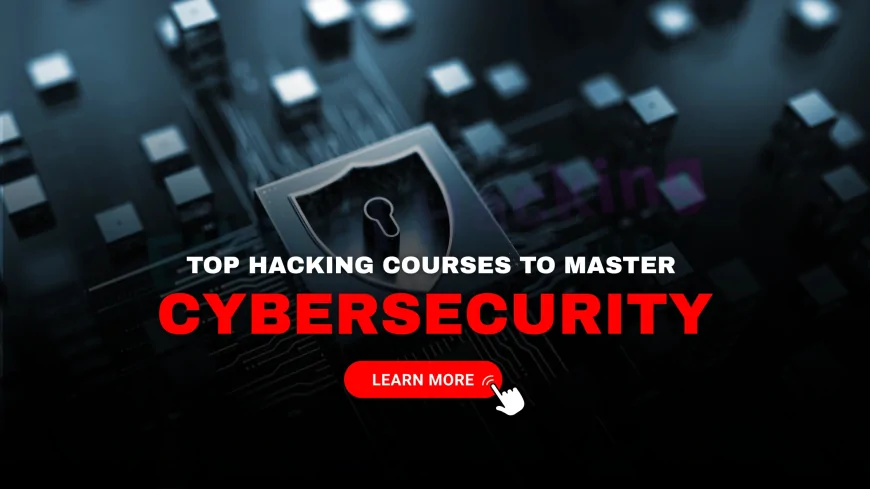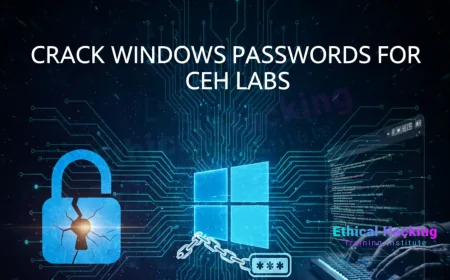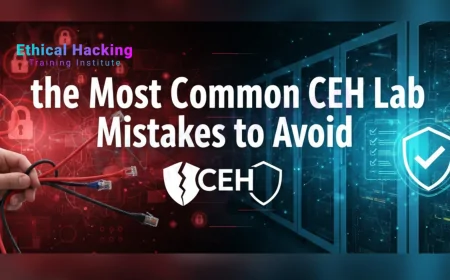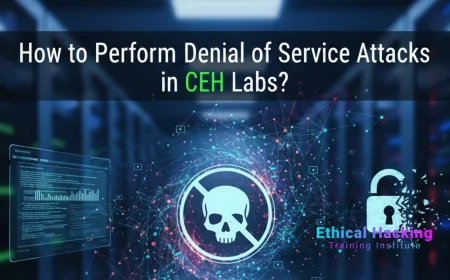Master the Art of Computer Hacking with These Top Courses | Best Hacking Courses Online to Sharpen Your Cybersecurity Skills
Learn how to master ethical hacking and cybersecurity in 2025. Explore the best computer hacking courses, certifications, career paths, and hands-on training platforms.

Table of Contents
- Introduction
- Why Learn Computer Hacking?
- Ethical vs Unethical Hacking
- Top Computer Hacking Courses in 2025
- Course Comparison Table
- What to Look for in a Hacking Course
- Career Opportunities After Completing the Course
- Certifications That Matter
- Self-Paced vs Instructor-Led Learning
- Hands-On Projects & Labs
- Top Online Platforms for Ethical Hacking
- Cost & Duration of Courses
- Continuing Education & Skill Updates
- FAQs
- Conclusion
Introduction
In 2025, the global threat landscape in cybersecurity is more complex than ever. Cyberattacks are evolving, and organizations urgently need skilled ethical hackers to test systems, plug vulnerabilities, and secure data. If you're interested in learning how to hack — the ethical and legal way — then enrolling in a certified computer hacking course is the perfect first step.
Why Learn Computer Hacking?
Computer hacking, when used ethically, is a high-demand skill with lucrative career opportunities. Ethical hackers identify weaknesses in IT systems, help prevent attacks, and support compliance with global security standards. By mastering hacking skills, you also become more aware of your own digital security.
Ethical vs Unethical Hacking
Ethical hacking is performed with permission to uncover system vulnerabilities. Unethical hacking is unauthorized and criminal. Ethical hackers use the same techniques as black-hat hackers — but with legal backing, following a strict code of conduct.
Top Computer Hacking Courses in 2025
- EC-Council’s Certified Ethical Hacker (CEH) – Industry gold standard with global recognition.
- Offensive Security Certified Professional (OSCP) – Highly hands-on and technical.
- Google Cybersecurity Certificate – Suitable for beginners entering IT security.
- CISCO CyberOps Associate – Great for network security professionals.
- Coursera Hacking for Beginners – Budget-friendly and flexible options.
Course Comparison Table
| Course | Provider | Level | Duration | Cert Provided |
|---|---|---|---|---|
| Certified Ethical Hacker (CEH) | EC-Council | Intermediate | 40 hours | Yes |
| OSCP | Offensive Security | Advanced | 90 days lab access | Yes |
| Google Cybersecurity | Google/Coursera | Beginner | 3–6 months | Yes |
What to Look for in a Hacking Course
- Accredited certificate
- Real-world labs and simulations
- Up-to-date curriculum
- Job assistance or placement support
- Peer and mentor interaction
Career Opportunities After Completing the Course
After completing a top ethical hacking course, you can apply for roles like:
- Penetration Tester
- Security Analyst
- Cybersecurity Consultant
- Malware Analyst
- Information Security Manager
Certifications That Matter
Some high-value certifications for ethical hackers include:
- CEH
- OSCP
- CompTIA Security+
- CISSP
- Certified Penetration Testing Engineer (CPTE)
Self-Paced vs Instructor-Led Learning
Self-paced courses offer flexibility but require discipline. Instructor-led options give you structure, expert support, and often better networking opportunities. Choose what fits your learning style best.
Hands-On Projects & Labs
Choose courses with practical labs, capture-the-flag (CTF) environments, and simulation-based training. Hands-on experience is crucial in cybersecurity.
Top Online Platforms for Ethical Hacking
Webasha Pune is a well-established cybersecurity and training institute that offers robust online platforms for individuals looking to master ethical hacking and related domains. Whether you're a beginner or an IT professional seeking certification, Webasha provides accessible, structured, and industry-recognized programs. Below are some of the top online ethical hacking platforms available through Webasha Pune:
1. Webasha Online Learning Portal
Webasha’s dedicated LMS (Learning Management System) is designed for remote learners, offering video lectures, live classes, quizzes, and downloadable resources. It supports self-paced learning with 24/7 access to content and mentor assistance.
2. CEH v12 Online Training Platform
Webasha is an EC-Council-accredited training partner and provides access to CEH v12’s official lab portal, eCourseware, and iLabs. This enables students to perform real-time penetration tests on virtual machines with guidance from certified trainers.
3. Virtual Cybersecurity Lab Access
Through its online platform, Webasha grants students access to cloud-based labs where they can simulate real-world hacking environments. These labs include tools like Metasploit, Burp Suite, Wireshark, and Kali Linux for hands-on learning.
4. Instructor-Led Zoom Sessions
All ethical hacking batches at Webasha Pune include live instructor-led sessions via Zoom or Google Meet. These classes cover key modules, Q&A interactions, and lab walkthroughs, making them ideal for students who prefer structured, real-time learning.
5. Doubt Clearing Forums & Community Groups
Webasha supports online discussion forums, Telegram groups, and student-only portals where learners can interact with mentors and peers. These communities are valuable for clarifying doubts, sharing insights, and preparing for interviews.
6. Webasha Mobile App (if available)
Webasha is planning (or has launched) a mobile app that enables students to continue learning on-the-go, attend live classes, access resources, and submit assignments directly from their mobile devices.
7. Certification & Placement Dashboard
Webasha’s online portal also includes a placement dashboard to track job opportunities, schedule mock interviews, and obtain official CEH certifications after completing assessments and exams.
Whether you aim to become a Certified Ethical Hacker, Penetration Tester, or Cybersecurity Analyst, Webasha Pune's online platforms provide comprehensive support to ensure successful outcomes in your ethical hacking career journey.
Cost & Duration of Courses
Costs range from ₹5,000 for entry-level Udemy courses to ₹1.2 Lakhs+ for advanced CEH or OSCP. Duration varies from a few weeks to several months depending on complexity.
Continuing Education & Skill Updates
Cyber threats evolve. Regularly update your certifications, participate in hackathons, and follow trusted sources like NIST, HackerOne, and security conferences such as DEF CON and Black Hat.
FAQs
1. What is ethical hacking?
Ethical hacking involves legally breaking into systems to identify and fix vulnerabilities before malicious hackers exploit them.
2. Is ethical hacking legal?
Yes, as long as it's performed with permission from the system owner.
3. Do I need a technical background to start?
No, many beginner courses start with foundational knowledge.
4. How long does it take to become a certified hacker?
Anywhere from 1 month to 6 months depending on the course.
5. What is the CEH certification?
The Certified Ethical Hacker (CEH) is a globally recognized credential offered by EC-Council.
6. Is CEH better than OSCP?
CEH is more theory-based while OSCP is highly practical. Choose based on your goals.
7. Can I learn hacking online?
Yes, platforms like Coursera, TryHackMe, and Udemy offer online ethical hacking courses.
8. Are these courses job-guaranteed?
Some courses offer placement support but job guarantees vary by provider.
9. What tools do ethical hackers use?
Common tools include Nmap, Metasploit, Burp Suite, Wireshark, and John the Ripper.
10. What is a penetration test?
It's a simulated cyberattack used to test the strength of an IT system's defenses.
11. How much can ethical hackers earn?
In India, salaries range from ₹4–20 LPA based on experience and location.
12. Do these courses offer certificates?
Yes, most premium courses offer completion or industry certifications.
13. Are there any free ethical hacking courses?
Yes, platforms like Cybrary and YouTube offer free tutorials for beginners.
14. What is the minimum age to start learning ethical hacking?
There is no legal age, but most certifications require you to be at least 18 years old.
15. What is bug bounty hunting?
Bug bounty hunters are ethical hackers who find bugs for companies and earn rewards.
16. Can ethical hacking be a freelance career?
Absolutely. Many hackers work freelance via platforms like HackerOne or Upwork.
17. Is coding required for hacking?
Basic scripting knowledge (Python, Bash) is helpful but not always mandatory at the start.
18. How can I practice hacking legally?
Use sandbox platforms like Hack The Box, TryHackMe, or CTF events.
19. Which course is best for beginners?
Google Cybersecurity Certificate or Coursera’s Ethical Hacking Beginner Track.
20. Are offline classes better than online?
Not necessarily. Online courses offer flexibility and similar value if they're from reputed providers.
Conclusion
Mastering computer hacking through ethical courses is a smart career move in 2025. With cybercrime rising, companies are willing to pay top salaries to skilled security professionals. Choose the right course based on your skill level, goals, and budget, and take your first step toward becoming a certified ethical hacker.
What's Your Reaction?
 Like
0
Like
0
 Dislike
0
Dislike
0
 Love
0
Love
0
 Funny
0
Funny
0
 Angry
0
Angry
0
 Sad
0
Sad
0
 Wow
0
Wow
0

















